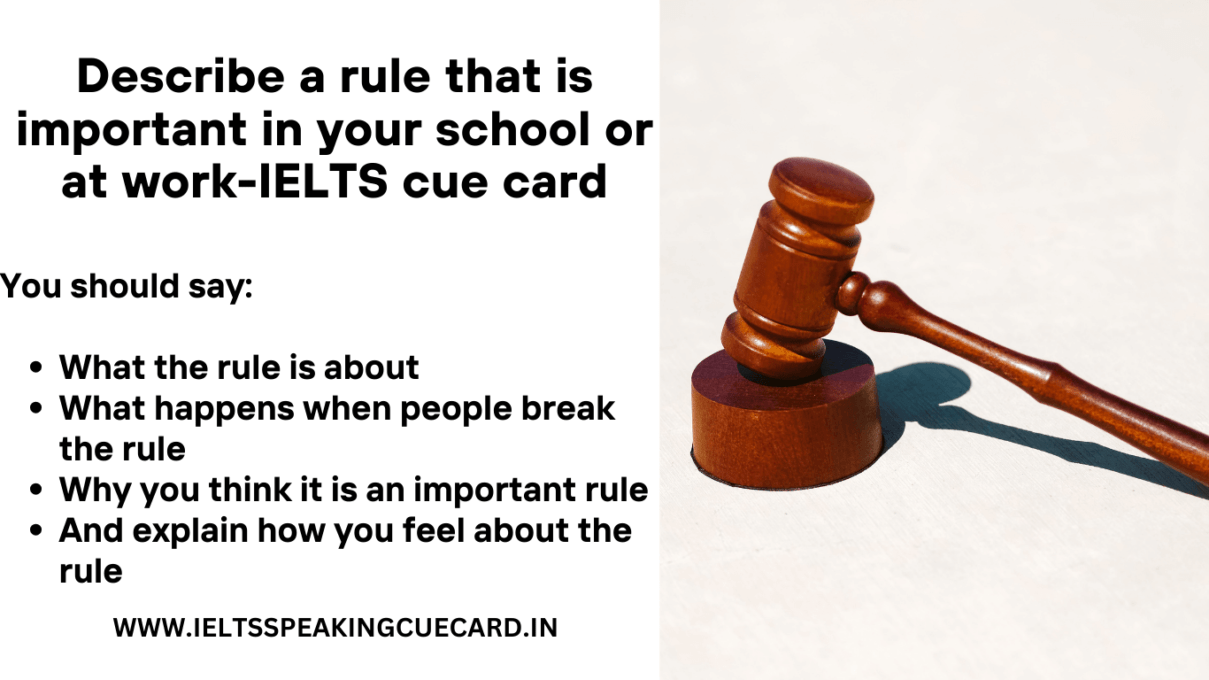Describe a rule that is important in your school or at work
You should say:
- What the rule is about
- What happens when people break the rule
- Why you think it is an important rule
- And explain how you feel about the rule
Sample Answer-1

Introduction:
Rules are the backbone of any organized institution, and today, I will discuss a crucial rule that is enforced in my school—a dress code policy. This rule holds great significance in our educational institution, reflecting the values of discipline, equality, and respect for the learning environment.
What the rule is about:
The dress code policy in my school stipulates specific guidelines regarding the attire students are allowed to wear. It generally includes requirements related to the type of clothing, colors, and accessories that are permitted within the school premises. For example, it may require students to wear uniforms or adhere to a specific dress style.
What happens when people break the rule:
In the case of dress code violations, the consequences typically involve warnings, counseling, or corrective measures. For instance, students who repeatedly disregard the dress code may be asked to change into appropriate attire, and parents may be informed about the infractions.
Why you think it is an important rule:
The dress code policy is crucial for several reasons. Firstly, it promotes a sense of unity and equality among students by eliminating socio-economic disparities in clothing. Secondly, it creates a focused and professional atmosphere that is conducive to learning. Lastly, it prepares students for the expectations of the professional world, where appropriate attire is often required.
How you feel about the rule:
I believe that the dress code policy is an essential aspect of maintaining a structured and respectful school environment. It ensures that students are not distracted by clothing choices, and it fosters a sense of belonging and pride in our school’s identity. Personally, I appreciate the sense of equality and discipline it brings to our school community.
Sample Answer-2

Introduction:
Workplaces are often governed by a set of rules and regulations to maintain order, professionalism, and ethics. One of the most vital rules in my workplace, which I would like to discuss today, is the “Confidentiality and Data Protection” policy.
What the rule is about:
The “Confidentiality and Data Protection” rule lays down strict guidelines on how sensitive information, both internal and external, should be handled within the organization. It covers aspects such as safeguarding client data, proprietary information, and maintaining the privacy of employees.
What happens when people break the rule:
Breach of the “Confidentiality and Data Protection” rule is treated as a grave offense in my workplace. Depending on the nature and severity of the breach, consequences can range from formal warnings and suspension to termination of employment. These measures are in place to protect the organization’s reputation and maintain trust with clients.
Why you think it is an important rule:
This rule is paramount because it not only safeguards the organization’s interests but also ensures trust and integrity in all business dealings. By upholding confidentiality and data protection, my workplace can maintain a competitive edge and protect sensitive information from falling into the wrong hands.
How you feel about the rule:
I strongly support the “Confidentiality and Data Protection” rule at my workplace. It reflects the organization’s commitment to ethical conduct and professionalism. Knowing that my personal and professional information is safeguarded creates a sense of security and trust, allowing me to work confidently and contribute to the company’s success.
Follow-up Questions:
1.Should schools have rules?
– Yes, schools should have rules as they provide structure, ensure a conducive learning environment, and promote discipline among students.
2.Should schools decide how long the working hours should be?
– Yes, schools should determine the appropriate working hours to optimize learning and provide a balanced educational experience.
3.What kinds of rules do Indian families have?
– Indian families often have rules related to respect for elders, daily routines, and cultural traditions. These rules vary from one family to another.
4.Do you think strict rules are needed in schools?
– Yes, strict rules in schools help maintain order, ensure safety, and create a focused learning environment.
5.Should students be involved in rule making?
– While students’ input can be valuable, final rule-making decisions are typically the responsibility of school authorities and administrators.
6.What rules should children follow at home in your country?
– Children in India are expected to follow rules related to chores, homework, respect for elders, and adherence to family traditions.
7.On what occasions can children be forgiven if they don’t follow some rules?
– Children may be forgiven for minor rule infractions, especially if they demonstrate remorse and a willingness to learn from their mistakes.
8.What rules should people follow when using public transport?
– Public transport users should follow rules related to ticketing, queueing, not littering, and respecting the safety guidelines set by the transportation authorities.
9.What kinds of rules do people need to follow in public places?
– In public places, people should follow rules related to cleanliness, noise levels, traffic regulations, and respecting public property.
10.What are the reasons that cause people to break rules?
– People may break rules due to ignorance, carelessness, convenience, or sometimes as a form of protest. Understanding the underlying reasons is crucial for addressing rule violations.
11.When people break rules, how would they be punished in your country?
– The punishment for rule violations in India varies depending on the severity of the offense and the context. It may range from warnings and fines to legal action in more serious cases.

